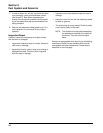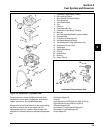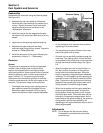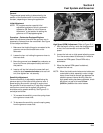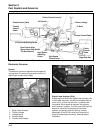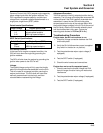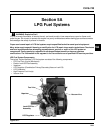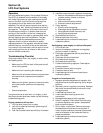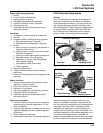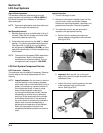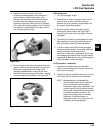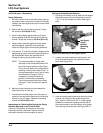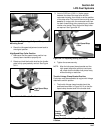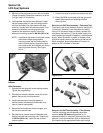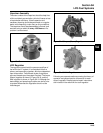
5A.2
Section 5A
LPG Fuel Systems
Operation
In a liquid withdrawal system, the Liquefied Petroleum
Gas (LPG) is released from the bottom of the supply
tank under high pressure. Upon opening the shut-off
valve on the tank, liquid fuel travels out through the
high pressure line to the electric lock-off/filter
assembly. The lock-off opens internally when the key
switch is turned “on,” permitting filtered fuel to flow to
the vaporizer. The vaporizer is mounted in the flow of
the discharged cooling air. It absorbs heat from the
cooling air and transfers it to the fuel, changing the
liquefied petroleum to a vapor or gaseous state, while
partially stepping down the fuel pressure. The gas/
vapor flows under this decreased pressure to the
regulator where it is further reduced to a usable,
regulated pressure. The regulator, activated by intake
manifold vacuum, controls fuel flow to the carburetor.
In the venturi of the carburetor, the fuel vapor is mixed
with incoming air from the air cleaner in the correct
ratio for efficient combustion.
Troubleshooting Checklist
If the engine starts hard, runs roughly, or stalls, check
the following areas.
• Make sure the LPG fuel tank is filled and shut-off
valve is fully opened.
• Make sure fuel is reaching the carburetor.
• Make sure the air cleaner element and precleaner
are clean and all components are fastened
securely.
• Make sure the ignition, governor, exhaust, throttle,
and choke control systems are all operating
properly.
• Check compression.
If engine continues to start hard, run roughly, or stall
after these checks have been made, use the following
troubleshooting guide.
Engine cranks but will not start
1. LPG fuel tank closed, low, or empty.
2. Lock-off not opening electrically, preventing fuel
flow to vaporizer.
3. Fuel filter (located inside lock-off) dirty or blocked.
4. Insufficient vacuum signal, regulator not opening.
a. Vacuum line between carburetor and regulator
cracked, leaking, kinked, or pinched.
b. Carburetor loose.
c. Intake manifold loose or leaking.
d. Excessive internal engine wear.
5. Faulty regulator.
a. Primary valve not opening.
b. Diaphragm spring adjustment incorrect.
c. Idle adjustment screw incorrectly set.
d. Vent(s) blocked/restricted.
6. Restricted/blocked fuel line.
7. Blocked carburetor fuel circuit.
8. Loose/leaking fuel enrichment hose (Impco
carburetor system).
Hard starting, runs roughly, or stalls at idle speed
1. LPG fuel tank low.
2. Vacuum line between carburetor and regulator
pinched, cracked, or leaking.
3. Carburetor idle speed set too low (should be at
least 1200 RPM).
4. Carburetor idle circuit restricted.
5. Dirty/restricted air cleaner.
6. Dirty/restricted lock-off filter.
7. Frozen/malfunctioning regulator. Check/adjust
primary pressure.
8. Excessive external load on engine.
9. Excessive internal wear.
10. Loose/leaking fuel enrichment hose (Impco
carburetor system).
Irregular or inconsistent idle
1. Improper operation/adjustment of regulator, idle
adjustment screw, throttle opening, and/or engine
governor.
2. Secondary valve in regulator not closing. Readjust
idle screw (couterclockwise) so valve can close
fully against seat.
3. Loose/leaking vacuum line.
4. Loose carburetor mounting and/or line
connections.
5. Damaged diaphragm(s) within regulator.
6. Debris in regulator. Flush debris from drain plug
or remove regulator from system, disassemble
body and remove debris.
7. Dirt or debris in carburetor. Remove carburetor,
disassemble and clean/service as required. If
venturi (Impco carburetor) removal is performed,
mark its orientation to the carburetor body for
proper reinstallation.
8. Loose/leaking fuel enrichment hose (Impco
carburetor system).



